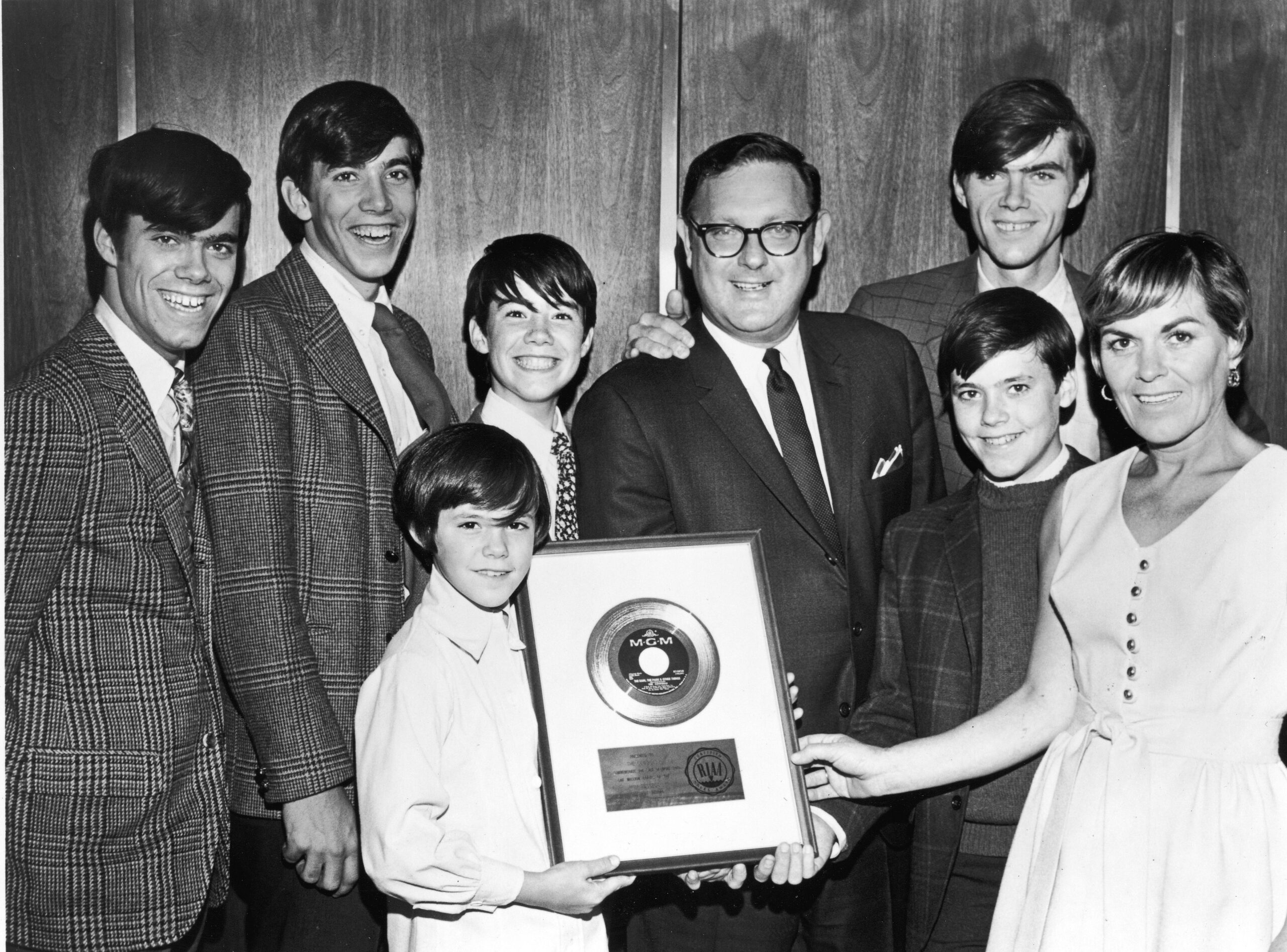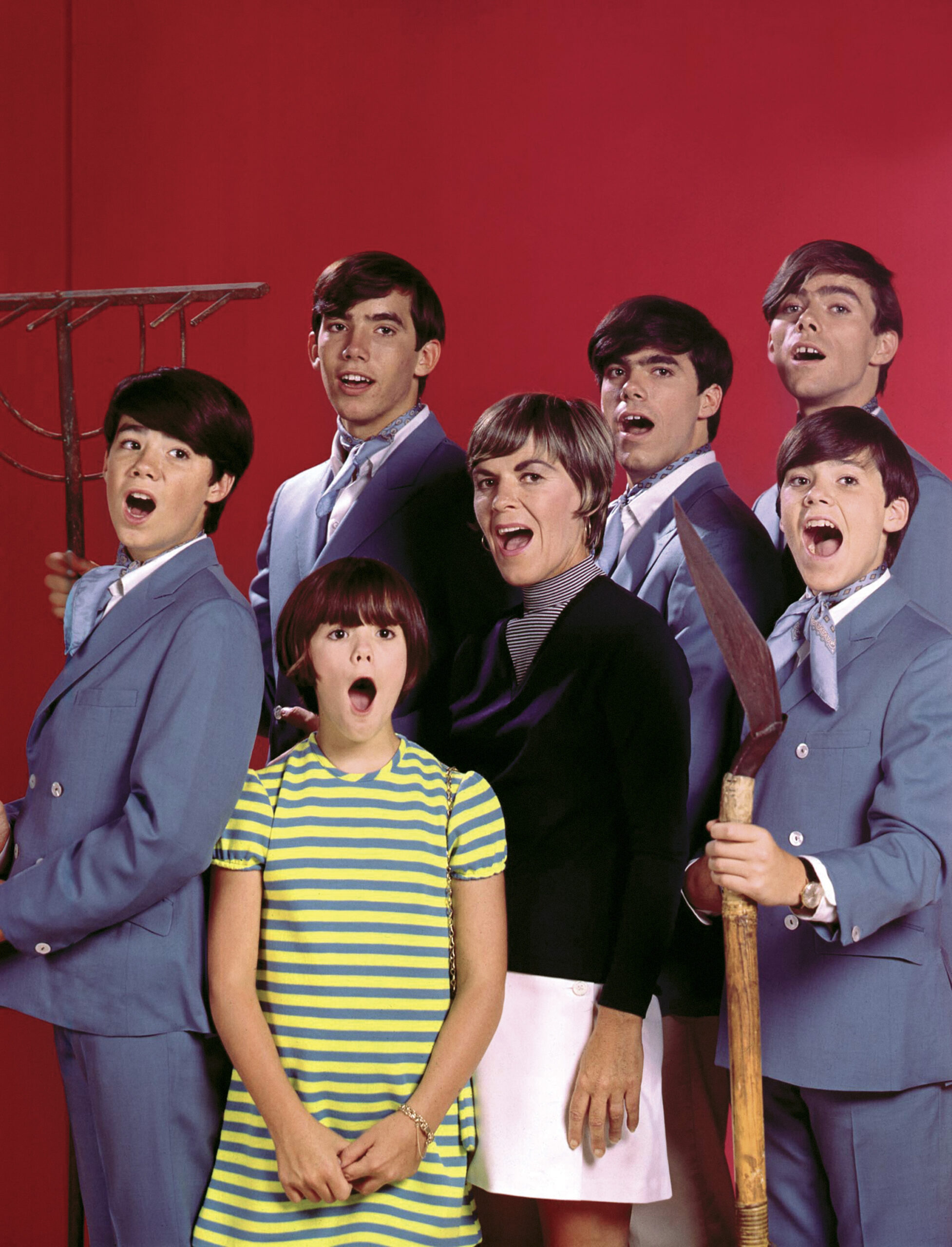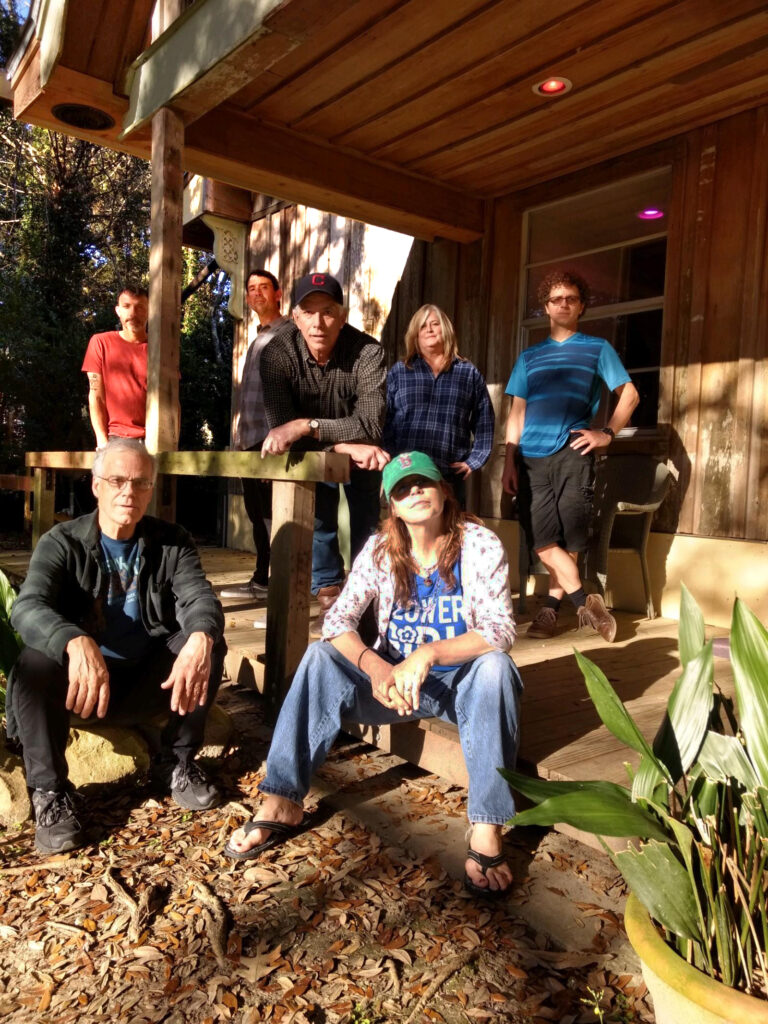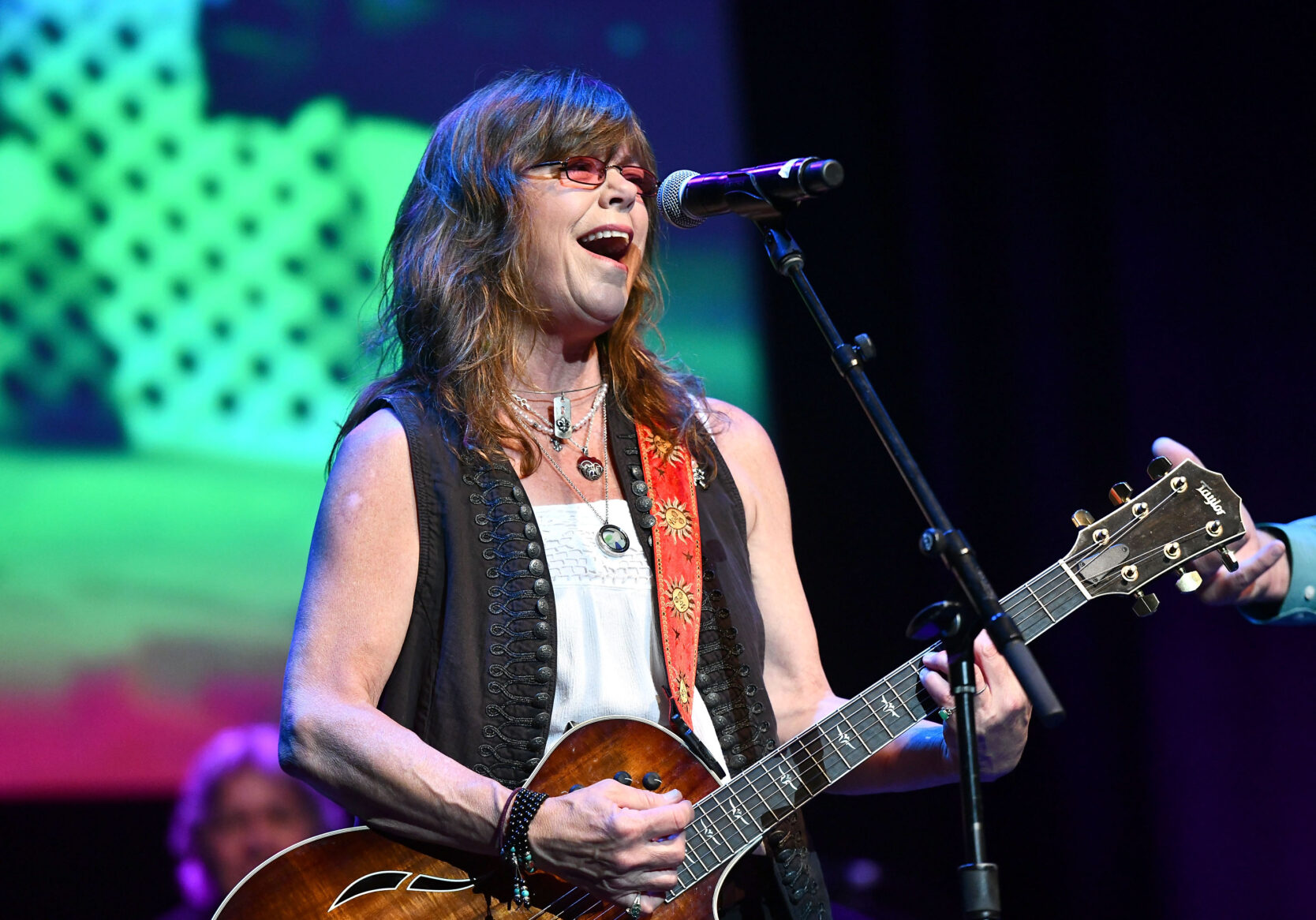“Music on stage was always our playground, always our candy field, always where we were the happiest,” says Bob Cowsill, sitting on a sofa in a Louisville, Kentucky dressing-room trailer with his sister Susan and brother Paul.
“Even if everything around us might not have been happy at all,” he adds.
Yes, those Cowsills. “The Rain, the Park and Other Things.” “We Can Fly.” “Indian Lake.” The frisky hit version of the title song from Hair, all huge hits in the latter 1960s. They were darlings of 16magazine and Tiger Beat. They appeared on every major (and minor) variety show, including The Ed Sullivan Show. And, of course, as a group of young siblings (brothers Bob, Paul, Barry, Bill and John, with Susan joining when she was just seven) plus mom Barbara, they were the inspiration for their TV doppelgänger The Partridge Family.
Their life was chronicled in detail in the 2011 documentary Family Band: The Story of the Cowsills, from their beginnings in Newport, Rhode Island.

It’s a story of some triumphs, but marked by trauma. Most of the latter, emotionally and physically, came from their father, who ruthlessly controlled and often sabotaged the Cowsills’ career. (Thanks to him, a 10-show Ed Sullivancontract was canceled after just two, and that’s hardly the worst of it.) By the 1970s, the Cowsills were a pop irrelevancy, various siblings saddled with substance and personal problems.
And there’s tragedy and loss in the deaths of Barbara from emphysema in 1985, Barry in the aftermath of Hurricane Katrina in 2005 and Bill of chronic health issues in early 2006. (A seventh sibling, Bob’s twin Richard, who their father cruelly never let be a part of the classic group, also died in 2014.) At times, it’s harrowing.
“But [making music on stage] has been with us for our whole lives to this very day,” Bob says.
On this very day, as they chat on Zoom, they are soon to be on stage at the Kentucky State Fair, doing those songs as part of the bill of the Happy Together ‘60s nostalgia tour, topped by the Turtles and featuring Gary Puckett of the Union Gap, the Association, the Buckinghams and the Vogues. It’s the seventh year the Cowsills have done this trek.
This year there are even more good things happening. Foremost, there’s Rhythm of the World, the first new Cowsills album since the power-pop gem Global, from way back in 1998. The new album showcases both their songwriting (the ‘60s hits were written by others, but from the very start the Cowsills’ repertoire was built on originals) and of course the vocal blend that can only come from family. Omnivore Records is releasing Rhythm…, with plans also for expanded reissues of Global and the “lost” 1978 treasure, Cocaine Drain.

Meanwhile, they’re booked for a six-week engagement on the holiday variety show at the Andy Williams Moon River Theatre in Branson, Missouri, starting November 1.
“With ladies dancing behind us while we sing ‘The Most Wonderful Time of the Year’ and our four hits,” Susan says, genuinely thrilled.
And every week they team for a lively, popular podcast, often featuring guests who share their ‘60s pop celebrity.
“It has been the funnest thing that we’ve ever done,” Paul says. “Even though Susan’s in New Orleans, Bob is in the [San Fernando] Valley and I’m in Oregon, every week we’re together.”
It’s an unlikely Cowsills boom time.
“We’re just lucky,” says Bob. “We’re lucky to be talking to you. I’m 72! I mean, I can’t believe we’re doing this. This is fantastic!”
Susan is the only one of them who has built a full-time music career, relocating to New Orleans from Los Angeles in the early 1990s with the indie supergroup the Continental Drifters and then establishing herself as a solo act. Bob has had a regular gig playing a Valley pub for years, but made his living in the field of medical records software systems. And Paul has had various jobs, including caregiver and landscaper on movie sets.
Of course, the past is never gone. They may very well encounter it when they step out of the trailer.
“We call it ‘documentary face,’” says Susan. “We can always tell when somebody has just seen the movie. We’ll be in a crowd. We’ll be happy, having a great time and we’ll look and someone will be coming at us like this.” She makes an exaggerated sad expression. They all laugh. “It’s very funny.”
So, Paul says, in recent years they’ve had to reassure people, “‘Oh, it’s okay! Everybody’s good. We’re happy. Everything’s groovy.’”

It sure is on the album. Not “groovy” as in “sounds like the ‘60s.” But it connects to the Cowsills’ origins in spirit, the paths they took through all the good and the bad, emerging strong, determined and, yes, like the guy who loves the flower girl in “The Rain, the Park and Other Things,” happy.
Rhythm… also introduces a recharged family band — Bob’s son Ryan on keyboards and Paul’s son Brendon on guitar, with Susan’s husband Russ Broussard on drums and Susan and Russ’ Louisiana friend Mary Lasseigne on bass. The album was made in Southern Louisiana with a vibe evoking the excitement of the brothers’ very first teenaged sessions decades ago.
“The seven of us went in at 11:00 every morning and came out at seven at night until it was done, with no interference from anybody,” Bob says. “It was just us and Justin Tocket, our engineer. We just did it. It was so fun to record that way.”
There were a few speed-bumps, notably the 2019 collapse of crowd-funding platform Pledge Music and money that fans had contributed to finance the project vanishing with it. But soon longtime fan Dr. Rock Positano (a pioneer in non-surgical treatments for foot disorders) and his family took the roles of executive producers and put the project back on track.
The very existence of Rhythm…is a win — a hard-won win. In some ways, the seeds were planted nearly two decades ago. Bob, Paul, Richard, John, Barry and Susan joined at L.A.’s El Rey Theatre for a 2004 benefit for ailing brother Bill. Shirley Jones, Mom Partridge herself, introduced them on stage, and Cowsill-by-marriage Vicki Peterson of the Bangles guested (John is her hubby, not to mention that she was in the Continental Drifters with Susan).
And that October they were asked to sing “The Star Spangled Banner” before a Red Sox-Yankees playoff game at Boston’s Fenway Park. Though tensions surfaced while they rehearsed, with less-experienced Richard struggling to nail his vocal part (a scene preserved in the documentary), once they got on the field to sing it was lovely.
But then came Barry’s death, followed by Bill’s. Eventually, though, the survivors started doing shows (John, who has a full-time gig drumming in Mike Love’s Beach Boys, would sometimes join in) and the road to Rhythm…opened up.
Roads and overcoming obstacles, not surprisingly, are themes of some of the new songs: “Broken Road,” “The Long Run.” But the dominant theme is of connections, bonds: “Lend a Hand,” “Goodbye’s Not Forever,” sprung from the loss and divisions the family has experienced over the decades. That, most profoundly, comes in the final song, the most personal of the batch, “Katrina.” It’s the first song that the three ever wrote together.
“We all teamed up for ‘Katrina,’” Bob says. “That’s the song about our brother Barry. We’re writers. And for years, no one [of the Cowsills] is going to write about Katrina. Well, what are we going to write about Katrina? Well, then, eventually a lyric came to me, I think from beyond. ‘Katrina’ is based on Barry’s perspective, which died in that situation.”
Susan continues, “The three of us had never written together and I’m not kidding when I tell you it was very strange. It came in 15 minutes. We were done. It was like, ‘Well, let’s just do it.’”
And that could be the Cowsills creed. Given the history, some might ask not just how they survived as a band, but how they survived as a family. Susan sums it up: “Each other, the camaraderie and the music is how we got through it,” she says. “It’s so funny. I forget we got through it! I’m really proud of us, because we are having the best time and we just made a beautiful record and it is what you choose, isn’t it?”




